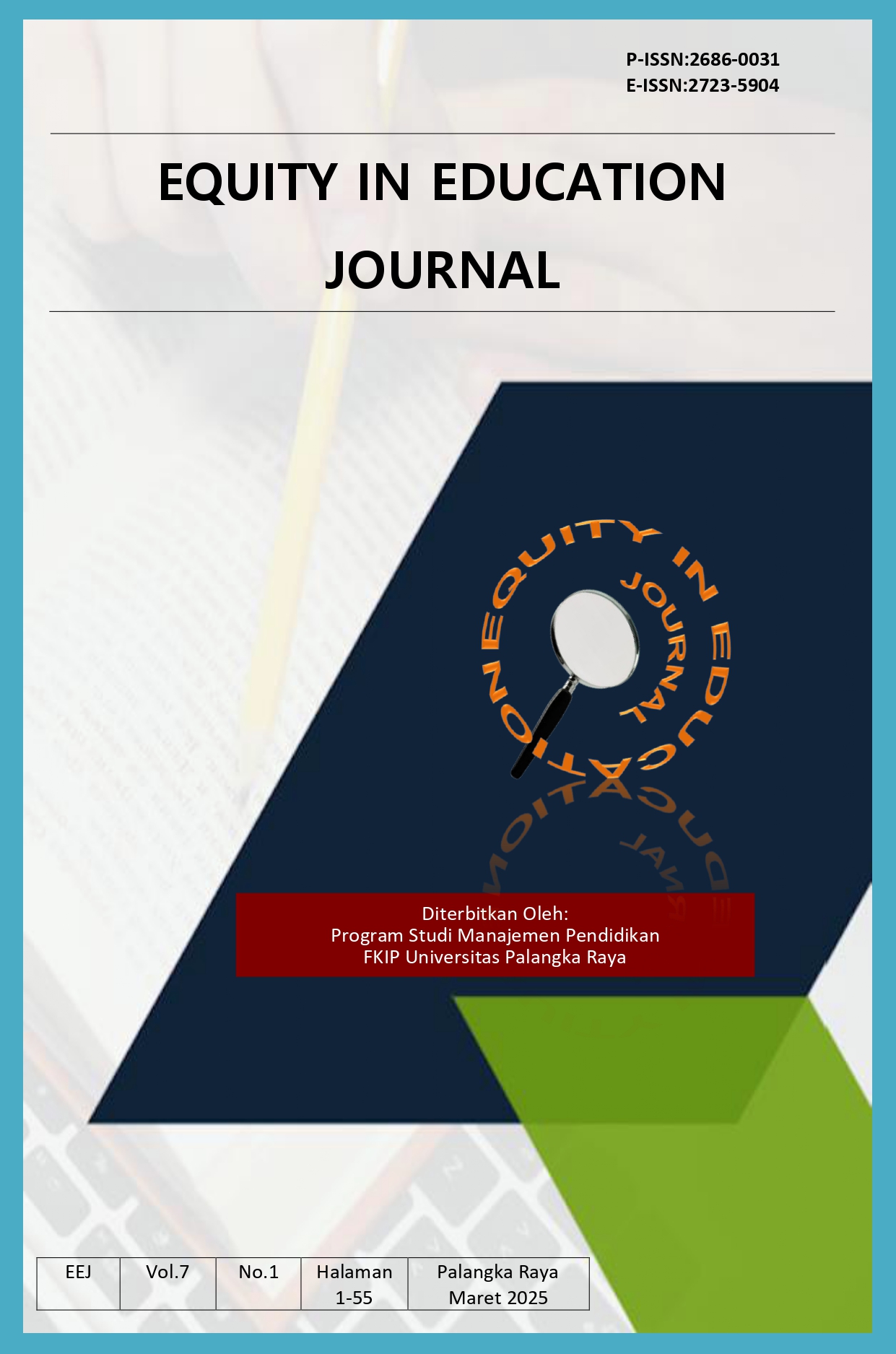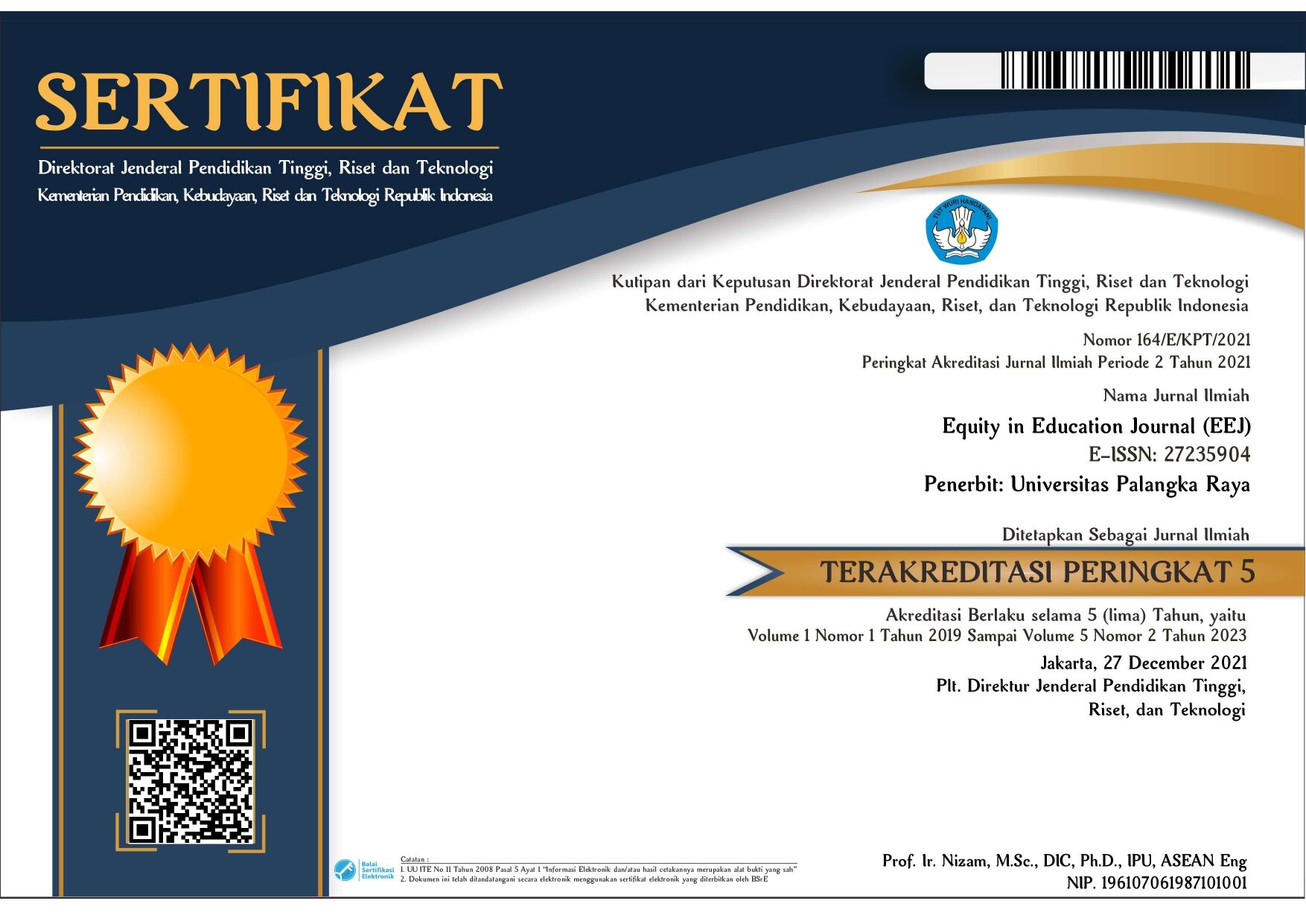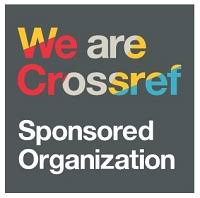MANAJEMEN SEKOLAH TERPENCIL
DOI:
https://doi.org/10.37304/eej.v7i1.19059Keywords:
Manajemen Sekolah, Sekolah Terpencil, SMPN 1 Pinogu, Provinsi Gorontalo.Abstract
This study aims to describe the educational management process in schools located in remote or hard-to-reach areas, particularly in the remote area of Gorontalo Province, as viewed from: (1) teacher management, (2) learning, and (3) facilities and infrastructure at SMPN 1 Pinogu. This study uses a qualitative approach with a case study design. Data collection techniques used include interviews, observations, and documentation. Data analysis employs interactive data analysis, supported by data validity checks using triangulation techniques. The research findings indicate that: (1) teacher management is conducted through the recruitment and placement of local teachers with a bachelor's degree qualification, as well as training through the MGMP; (2) Learning management includes curriculum design and learning activities using lesson plans, syllabi, and competency-based learning outcomes, although the use of technology is limited due to limited internet access and electricity; and (3) Facilities and infrastructure management includes infrastructure planning through collaboration with the government and school committee, building maintenance, and management of technological equipment such as laptops and projectors that are shared among teachers.
Downloads
References
Arikunto, S. (2002). Prosedur penelitian: Suatu pendekatan praktik. Jakarta: Rineka Cipta.
Bararah, I. (2020). Pengelolaan sarana dan prasarana pendidikan dalam meningkatkan kualitas pembelajaran. Jurnal Mudarrisa, 10(2), 351–370. https://doi.org/10.22373/jm.v10i2.7842
Budiastuti, D., & Bandur, A. (2018). Validitas dan reliabilitas penelitian: Dilengkapi analisis dengan NVIVO, SPSS dan AMOS. Jakarta: Mitra Wacana Media.
Dewi, T., & Noor, T. R. (2024). Pengelolaan sarana dan prasarana pendidikan di Madrasah Ibtidaiyah Tarbiyatus Syarifah Sidoarjo. MANAZHIM, 6(1), 23–36. https://doi.org/10.36088/manazhim.v6i1.3869
Falah, A. I., & Hadna, A. H. (2022). Problematika Pendidikan Masa Pandemi di Indonesia pada Daerah 3-T (Terluar, Tertinggal, dan Terdepan). Jurnal Pendidikan Dan Kebudayaan, 7(2), 164 - 185. https://doi.org/10.24832/jpnk.v7i2.2997
Harris, A., & Muijs, D. (2005). Improving schools through teacher leadership. Open University Press.
Leithwood, K., & Jantzi, D. (2005). Transformational leadership. In B. Davies (Ed.), The essentials of school leadership (pp. 31-43). SAGE Publications.
Masjudin., & Husniati. (2018). Optimalisasi Pengelolaan Tenaga Kependidikan Untuk Meningkatkan Mutu Pendidikan. Ta’dib, 16(I), 70–86.
Miles, M. B., & Huberman, A. M. (1994). Qualitative data analysis: An expanded sourcebook (2nd ed.). Thousand Oaks, CA: Sage Publications.
Nasir, & Mujiati. (2020). Pengelolaan tenaga pendidik (guru) di rural area. Didaktis: Jurnal Pendidikan dan Ilmu Pengetahuan, 20(1), 22–35. https://doi.org/10.30651/didaktis.v20i1.4383
Nurussalami, N. (2022). Pengelolaan tenaga pendidik dan kependidikan dalam peningkatkan mutu pendidikan. Intelektualita, 11(1), 88–99.
Peraturan Menteri Pendidikan Nasional (Permendiknas) Nomor 19 Tahun 2007 tentang Standar Pengelolaan Pendidikan oleh Satuan Pendidikan Dasar dan Menengah.
Peraturan Presiden (Perpres) Nomor 131 Tahun 2015 tentang Penetapan Daerah Tertinggal Tahun 2015-2019.
Raihani. (2007). Education reforms in Indonesia in the twenty-first century. International Education Journal, 8(1), 172–183.
Robinson, V. M. J., Lloyd, C. A., & Rowe, K. J. (2008). The impact of leadership on student outcomes: An analysis of the differential effects of leadership types. Educational Administration Quarterly, 44(5), 635–674. https://doi.org/10.1177/0013161X08321509
Shafira, D., Aditya, F. A., Anggia, I. R., Putri, N. N. K., Hanif, S. A., & Prihantini, P. (2025). Tantangan dan Solusi dalam Pengelolaan Pendidikan Modern. Indo-MathEdu Intellectuals Journal, 6(1), 868–879. https://doi.org/10.54373/imeij.v6i1.2557
Sugiyono. (2019). Metode penelitian kuantitatif, kualitatif, dan R&D. Bandung: Alfabeta.
Tamam, H., Hasan, & Mubah. (2020). Pengelolaan pembelajaran di Sekolah Menengah Pertama Al-Faqih Sumber Nyamplong Kowel Pamekasan. Eduprof: Jurnal Pendidikan Profesi, 12(2), 145–155.
Ucok, R. A., Mas, S. R., & Suking, A. (2017). Kepemimpinan pembelajaran kepala sekolah dasar pada daerah terpencil di Kabupaten Tojo Una-Una. Normalita, 9(1), 12–23. https://ejurnal.ibu.ac.id/index.php/Normalita
Undang-Undang Nomor 20 Tahun 2003 tentang Sistem Pendidikan Nasional
Vangrieken, K., Meredith, C., Packer, T., & Kyndt, E. (2017). Teacher communities as a context for professional development: A systematic review. Teaching and Teacher Education, 61, 47–59. https://doi.org/10.1016/j.tate.2016.10.001
Warsono. (2020). Pengelolaan kelas dalam meningkatkan belajar siswa. Jurnal Pendidikan dan Pembelajaran, 15(2), 101–112.
Yesa. (2022). Manajemen sarana dan prasarana di daerah terpencil. EduTech Journal, 4(1), 54–63.
Yin, R. K. (2018). Case study research and applications: Design and methods (6th ed.). Thousand Oaks, CA: Sage Publications.
Downloads
Published
How to Cite
Issue
Section
License
Copyright (c) 2025 Asri Rahayu Hulopi, Arifin Suking, Zulystiawati

This work is licensed under a Creative Commons Attribution 4.0 International License.










